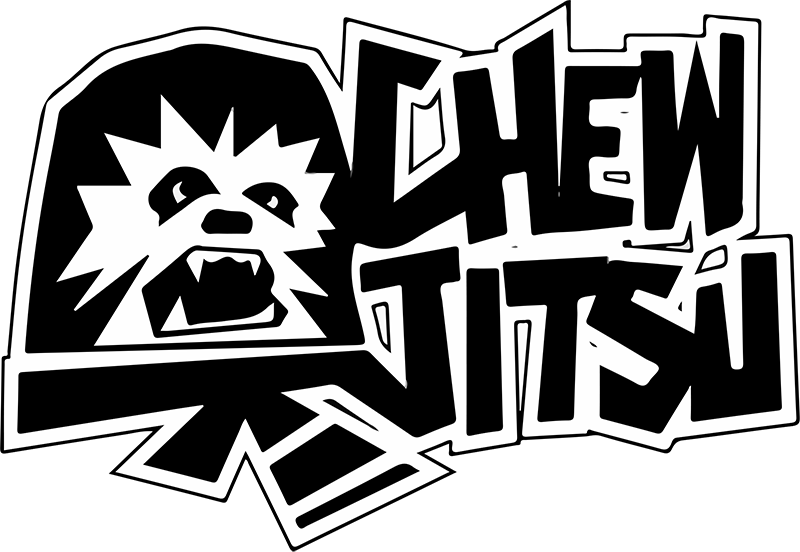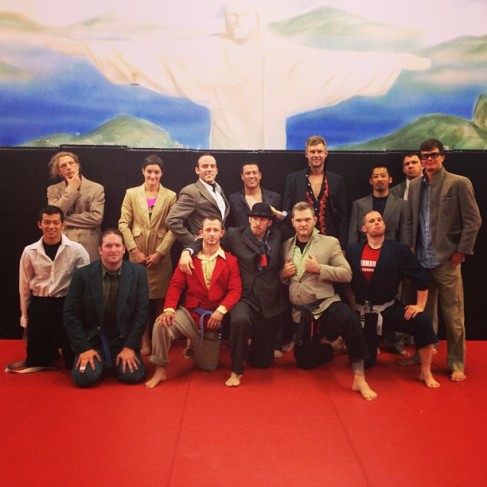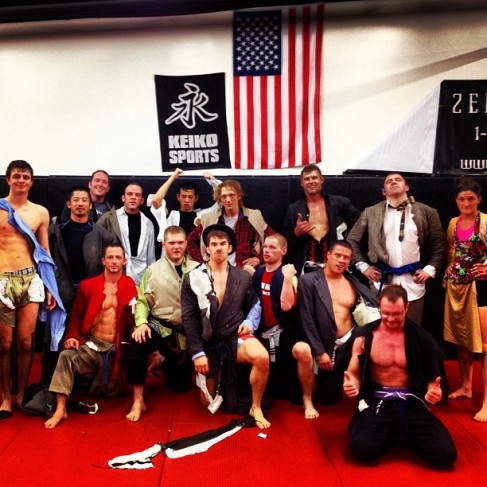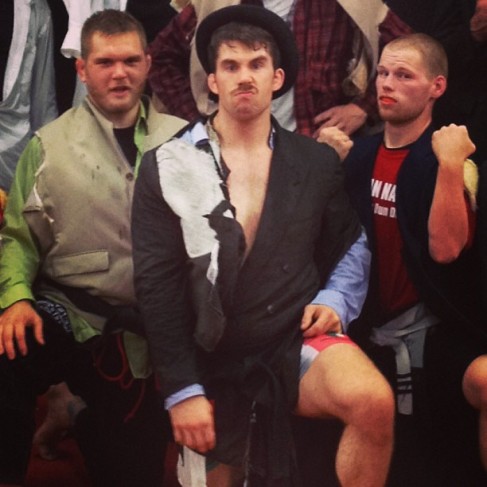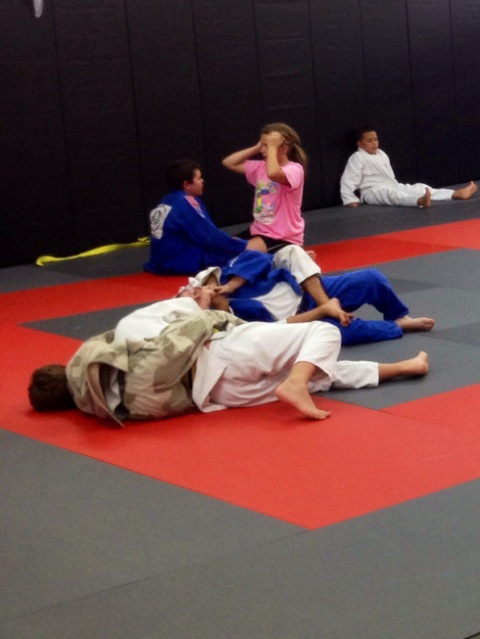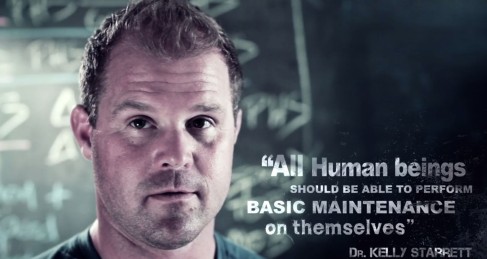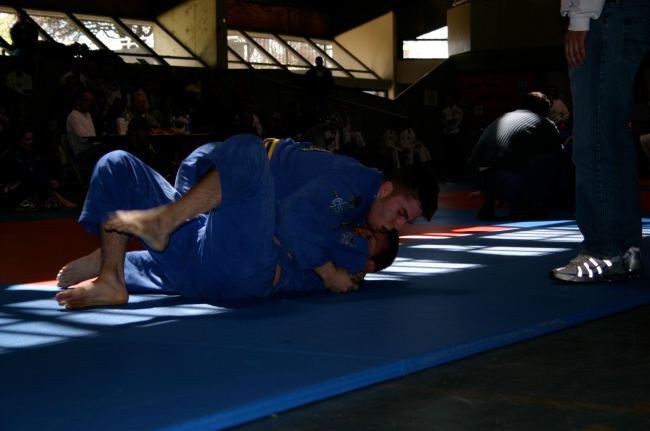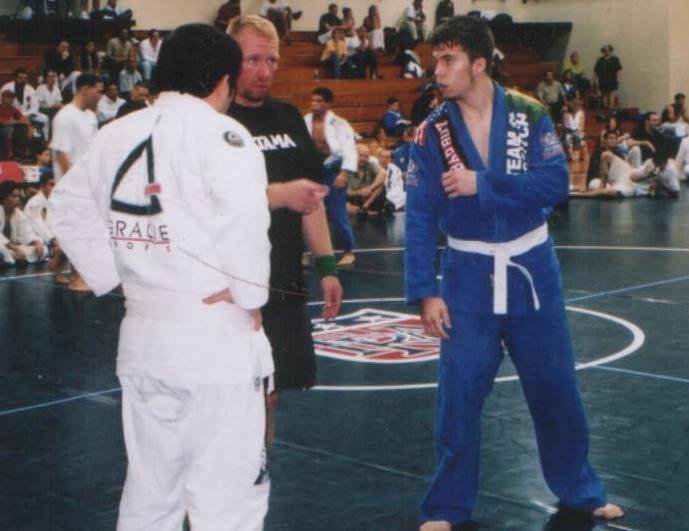Hows the men to women ratio at your gym? I’m sure it’s similar to most gyms and significantly more men train. However I can say that right now, there are more women training Brazilian Jiu-jitsu at my gym than ever before and I think its fantastic! With all the new women in the gym I asked them if there is anything that they were particularly interested in regarding BJJ. Many of them shared the same desire to hear from high level females in the BJJ community. I decided to reach out to a few of the women I know and ask them some questions.
We will start with Katie’s responses first. First off big thanks to Katie at http://skirtonthemat.wordpress.com/ for her insights on what its like to be a woman in BJJ. The responses are genuine and detailed. I hope you enjoy the question and answers listed below!
1. Tell me about yourself (Name, rank, years training, your line of work, any other info you’d like to share)
Katie, brown belt, 7 years this August, marketing coordinator for a real estate company, writer of SkirtontheMat, bookworm, klutz, etc. I currently train at Maxercise Academy in Philadelphia. http://www.maxercise.com/Home.html
2. What got you started in training?
The simple answer to that is I was working at the front desk of the academy at the time, and it was suggested I try out the class. It wasn’t my first encounter with grappling or even jiu jitsu: I have an older brother who wrestled in highschool and college, so being unexpectedly put into a clinch wasn’t really that foreign of a concept. Additionally, I can be pretty clumsy-so falling to the ground is not a terribly foreign concept either. Also while in college I was a part of the school’s radio station, and became friends with some of my co-hosts who were big fans of MMA: we would get together at someone’s house and watch UFC (back when it was once every 3 months or so) or Pride fights. I was interested in it, but also back then I was a lot more shy and it took someone encouraging me to try the sport. I took my first class, and it actually wasn’t until I took a second and third class that I really started to get a hang of it and started to enjoy myself.
3. Did you have any initial fears about training, if so how/when did you get over those?
Um, there was an initial anxiety, partially because everyone is naturally anxious in new situations. Additionally I think women are often encouraged to avoid full contact sports, which is really the biggest objection I hear when I talk to other women about trying jiu jitsu. Third, I had gained a lot of weight when I was in school which made me feel insecure. Not that I’ve ever been described as tiny, but the college lifestyle had definitely taken its toll. I would be partnered with someone to train, and especially in the beginning when you could obviously tell the weight discrepancy, and there were times I almost felt the need to apologize to my partner for being so…big. There’s no better way I can describe it. There were a variety of initial fears, including competition, which is completely natural: it’s not often you’re asked to get up in front of a bunch of people and try your hardest to choke someone or manipulate their joints in a way that could potentially injure them. But I find that facing those competition fears can lend to facing other anxieties, etc. in everyday life. You have already proven you can be anxious or scared of something, still “put your big girl pants on” and try your best, which I feel is an invaluable experience.
As what got me past anxiety about training, I think part of it had to do with the fact that I started to see results, belt changes, weight loss, a boost in confidence. For the most part the other students and instructors were patient and helpful, and it was pretty fun. I’m also goal oriented, and jiu jitsu became something I wanted to get better at, which kept me motivate to press on. Hooray for being stubborn and stuff. 🙂
4. What drives you to continue training?
A variety of reasons: I love puzzle/problem solving, and each training session has the potential to present a puzzle that needs to be solved. Also, personally it’s a great way to relieve stress. We all worry and sometimes over-think a situation, over-analyze conversations throughout the day, and a good hard training session is a great way to see “the forest for the trees” again- a way to kind of reset your perspective. The community is also a big aspect for me as well: we are very fortunate to have a great team with people from all walks of life coming through the door and welcomed onto the mats. We train hard, respect and support one another, even if that means pushing a fellow student to help them reach their goal.
5. What has been the biggest challenge of your BJJ career?
Ha, I have the same challenge as a lot of people- myself. Well, not me specifically. I think a lot of people, are hard on themselves and how well they do: in competition and sometimes even sparring. While a lot of this sport is physical and muscle memory, there is a lot of thinking, and particularly believing in yourself and your technique, and there is a tendency to lose sight of that. We toil, day in and out on these myriad of minute details- put your hand here, place your foot there, make sure you have just the right angle, match after match during training sessions that I think it’s easy to get lost and not really see the big picture. We beat ourselves up over a submission we didn’t get, all the while completely ignoring the beautiful sweep that was executed in the very same match. It’s a bit funny, and frustrating at times.
6. Are you a competitor, if so why do you compete?
Er, by technical definition, I guess I would say yes, I am a competitor: I train a lot, work out, diet, attend competitions and I enjoy competing in the fact that I feel accomplished win or lose if I step off the mat and really feel I put my skills to the test. I don’t really keep track of how many matches I have won, I’ve given most of my medals to the gym (I couldn’t even tell you which ones were mine), and instead I think about what I could have done better, and have even taken notes after a competition on things that I need to work on, using that opportunity to grow and advance as a jiu jitsu player (jiu jitsuka, whatever we’re calling ourselves these days).
7. Are there any resources or helpful tools that you use or would recommend to someone who trains?
Instructor, really would be my answer. I dabble here and there looking at Youtube videos, particularly if there is something I want to work on and I need to brush up on. There’s no one video channel I’m particularly attached to, though I like what I have seen so far from the BJJ Library. There are some cool things someone at an equal or higher rank will show that I’ll play around with to see if it will fit into my game, but the main thing is I’m a visual and kinesthetic learner: I have to see the technique being done to someone else, and then I need to do it myself to fully understand it. I am more concerned about what I learn during class or on the mats that I can drill, reference with a higher rank and drill again, rather than some crazy video I watched maybe once or twice.
8. Any funny story you’d like to share?
One of the fun things about traveling for competitions is there’s at least one good story, one memory you’ll take with you, regardless of winning or losing. We all went out together to this past year’s Pans: one of our blue belt guys competed, lost his first match, and came back to where we were sitting in the stadium to share with us,
“So, I went up to the acai stand the the guy was telling me how this stuff on top is good for memory, and this [topping] was great for athletes…I asked if he had anything for shame. He didn’t say anything.”
There are tons of moments you’ll gather throughout the years: if you have the time and means, one of the great things about jiu jitsu is the opportunity to travel for (usually for competition) to new places and meet new people, and you’ll have the opportunity to create a lifetime of memories.
9. Have you ever had to use your BJJ to protect yourself?
Fortunately, no. I am glad to know the self defense stuff and some judo, but also immensely glad that I have never had a need to use either: I am a big believer in being aware of your surroundings, and listening to your instinct when it’s telling you something’s not right.
10. How do you deal with training in a predominantly male sport?
When it comes to being a woman in jiu jitsu, there are some things that are great and then some elements that just suck. And, there are some decisions that are made when it comes to women, particularly divisions in tournaments where you think “who the hell thought that was a good idea?” And don’t even get me started about some of the gi choices. Yikes. Thankfully I think they stopped making the pink camouflage gi’s. Also, fortunately as the years go on and more women become involved in the sport, I think there will be less issues. There are some that will still persist however, particularly on a more local level. You’ll have men who enter an academy and doubt a woman’s ability due to their gender, there’s still a good chance when a woman will be the only female in a class- which being the token member of the opposite gender can be just as awkward the other way around. The sport in general has a high rate of attrition, and it’s extremely noticeable when it comes to women, which leads to a lot of competing against the same women in tournaments, even at national levels. We take these things in stride for the love of the sport. There is hope though: while our voice is still a small one in the jiu jitsu community, it is growing especially as more females become black belts.
11. Anything you’d like to share with females out there?
Um. nothing that I can think of- if anyone has a question for me I’ll be happy to answer; they can email me at thatclassybroad at gmail, go through you, whatever, but there’s nothing in particular that comes to mind.
As always, thanks for reading! Feel free to share any comments or thoughts in the section below or by email at chewjitsu@gmail.com .
